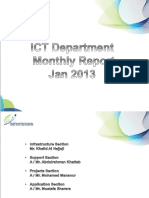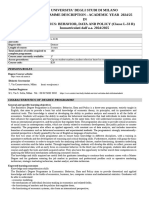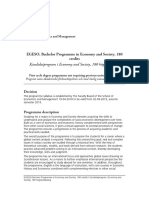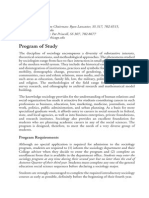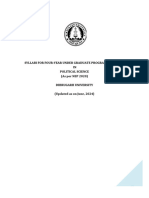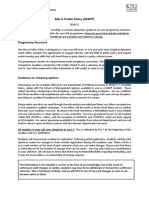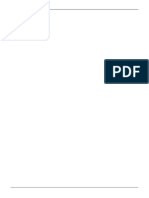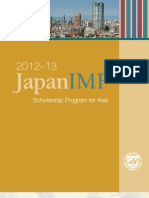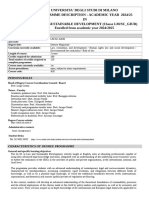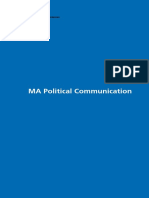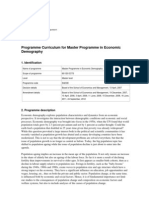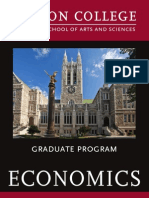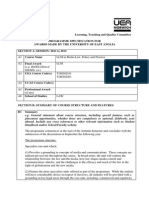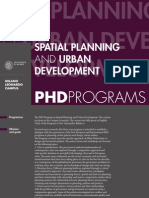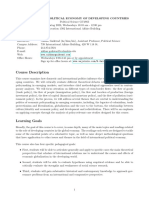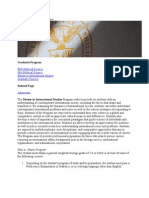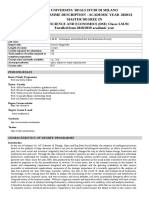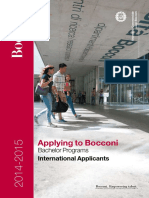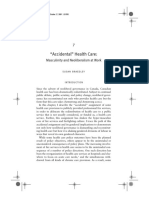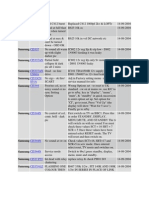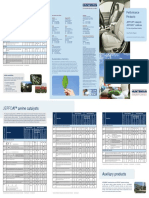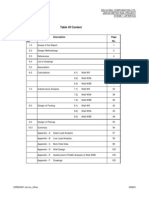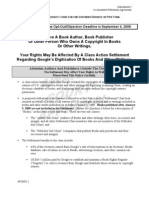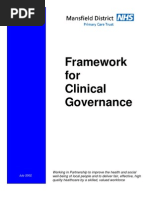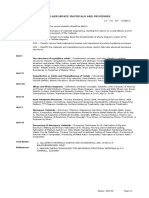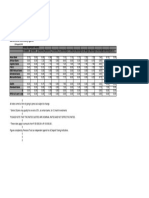Bachelor of International Politics and Government
Bachelor of International Politics and Government
Uploaded by
Neel ChakravartyCopyright:
Available Formats
Bachelor of International Politics and Government
Bachelor of International Politics and Government
Uploaded by
Neel ChakravartyOriginal Description:
Original Title
Copyright
Available Formats
Share this document
Did you find this document useful?
Is this content inappropriate?
Copyright:
Available Formats
Bachelor of International Politics and Government
Bachelor of International Politics and Government
Uploaded by
Neel ChakravartyCopyright:
Available Formats
Contact Center
from Italy: 02 5836.3434
from abroad: +39 025836.3535
Skype: www.unibocconi.eu/contactcenter
2015-2016
Bachelor of
International Politics
and Government
Universit Commerciale
Luigi Bocconi
www.unibocconi.eu/undergraduate
Universit Bocconi - October 2014
Universit Bocconi
Student Affairs Division
Guidance and Recruitment Office
piazza Sraffa 11
20136 Milano, Italy
The goal in creating
this program is to
contribute to
increasing the quality and value of
policy-makers, in particular by
giving them the quantitative tools
to develop and assess
policies. And to make
the world a better place.
Vincenzo Galasso
Program Director
Introducing International Politics
and Government
By any standard, Universit Bocconi is a leading school in its traditional areas of economics, management and law. This places us at
the crossroads of several subjects that contribute to government
policy-making, and we have now integrated this expertise into the
new multidisciplinary Bachelor program in International Politics
and Government.
The program concentrates on preparing students to work on all aspects of public policy-making. Courses in political theory, law, behavioral research and languages help them understand the context
within which a policy will be born; Bocconis longstanding reputation in management guarantees graduates the practical know-how
to implement it with competence and efficiency; and strong training
in quantitative economics and qualitative assessment provides for
policy evaluation at any moment and from any point of view.
Taught in English, the Bachelor of International Politics and Government takes a global approach that attracts globally-oriented
people. It all starts with bright students who are motivated to excel
in public service and drive change in our society in ways that promote ethical values, economic viability, international legitimacy
and political pragmatism.
Program Setup and Structure
Study Plan*
This new program can be described by three adjectives: international, with students and faculty who come from around the world;
exclusive, with a small class group composed of highly selected students only 60 students; and flexible, with one semester spent
studying abroad in a partner university and the option of doing an
internship.
1st year
Semester I
In the first two years, students will learn how to interpret the evolution of social, economic and political systems from an international perspective, and acquire a toolbox of soft and hard skills.
Semester II
Strong emphasis is placed on the key phases of a policys life cycle:
designing public policies which are both economically efficient
and politically sustainable
implementing public policies with an effective approach
evaluating public policies using modern quantitative and qualitative techniques
In the third year, students will gain international exposure by spending a semester abroad at one of our prestigious partner Universities.
A wide array of elective courses allows for a personalized study
path, and specialized workshops dig deeper into the core topics of
political science and public policy. Students can also choose to undertake an internship and build valuable labor market experience
in their areas of interest.
2nd year
Semester I
Semester II
3rd year
Semester I
Semester II
Political Science and Comparative Politics
Quantitative Methods for Social Sciences
(Module 1 - Mathematics)
Law (Module 1 - Comparative Public Law)
Introduction to Economics
(Module1 - Microeconomics)
Computer Skills
Introduction to Economics
(Module 2 - Macroeconomics)
History (Module 1 - Global History)
Political Philosophy
Quantitative Methods for Social Sciences
(Module 2 - Statistics)
Citizen Behavior Research Skills
First Foreign Language
Management of International,
Supranational and National Institutions
International Relations
Political Economics
Accounting and Financial Statement Analysis
Policy Evaluation
History (Module 2- History of Political Institutions)
Law (Module 2 - International and European Law)
Negotiation Skills
Second Foreign Language
Public Governance
Sociology
3 electives
Public Economics
Media and Political Communication
1 elective
Final Report
Total credit points
Course requirements are subject to change
After Graduation
CP
8
6
6
6
3
29
6
6
6
6
3
6
33
8
8
8
6
30
8
6
6
3
6
29
8
7
18
33
8
6
6
6
26
180
Graduates will have a set of skills, both theoretical and practical,
that will enable them to apply for junior professional positions at
home and abroad in many areas, including international organizations, regulatory authorities, and financial and other private firms
that deal with non-market environments.
Many will wish to broaden their career opportunities by continuing their studies, choosing an MSc program either in the area of
public management or in the areas of economics and social sciences, management and international management.
You might also like
- Air Instructor Manual March 14Document128 pagesAir Instructor Manual March 14jamesbeaudoin100% (1)
- Monthly Report ICT SimpleDocument30 pagesMonthly Report ICT SimpleAbdighaniMOGoudNo ratings yet
- LED Fabrication Instruction V1.0Document5 pagesLED Fabrication Instruction V1.0bakadesu senpaitachiNo ratings yet
- Salesforce Validation Rules Scenarios: Scenario 1: Complex Validation Rule For Opportunity ProbabilityDocument8 pagesSalesforce Validation Rules Scenarios: Scenario 1: Complex Validation Rule For Opportunity Probabilitynikhil patilNo ratings yet
- Power Points Sets Milgrom&Roberts Chapter7Document12 pagesPower Points Sets Milgrom&Roberts Chapter7Neel ChakravartyNo ratings yet
- Antwerp: in Collaboration With Visit AntwerpenDocument35 pagesAntwerp: in Collaboration With Visit AntwerpenNeel ChakravartyNo ratings yet
- A Study of Marginal Costing of Haier India Pvt. LTD Pune City.Document72 pagesA Study of Marginal Costing of Haier India Pvt. LTD Pune City.Asif MemonNo ratings yet
- Master ProgramsDocument14 pagesMaster ProgramscristianmondacaNo ratings yet
- Eng Manifesto B29of1 2025Document7 pagesEng Manifesto B29of1 2025perseus9949No ratings yet
- PHD Programme On Innovation, Economics and Governance For DevelopmentDocument12 pagesPHD Programme On Innovation, Economics and Governance For DevelopmentUNU-MERIT100% (1)
- Eng Manifesto B26of1 2025Document9 pagesEng Manifesto B26of1 2025perseus9949No ratings yet
- PHD Programme On Innovation, Economics and Governance For DevelopmentDocument12 pagesPHD Programme On Innovation, Economics and Governance For DevelopmentUNU-MERITNo ratings yet
- Undergraduatebrochure 2Document6 pagesUndergraduatebrochure 2rihabegnNo ratings yet
- EGESODocument7 pagesEGESOrizvee.tinka3003No ratings yet
- SOCI Course Catalog PDFDocument8 pagesSOCI Course Catalog PDFjulio7345No ratings yet
- 11 FYUGP Political ScienceDocument108 pages11 FYUGP Political SciencePOL PHUKONNo ratings yet
- MA in Public Policy-Handbook-2016-17 (KCL)Document14 pagesMA in Public Policy-Handbook-2016-17 (KCL)Hon Wai LaiNo ratings yet
- Joint PHD Programme UNU-MERIT and MGSoGDocument16 pagesJoint PHD Programme UNU-MERIT and MGSoGCarlos Cadena GaitánNo ratings yet
- GuideDocument11 pagesGuideNika PavliashviliNo ratings yet
- DIS Booklet Updated - 2021Document44 pagesDIS Booklet Updated - 2021Thou PutheaNo ratings yet
- Programme Guide BAPSHDocument69 pagesProgramme Guide BAPSHsidney SilvaNo ratings yet
- Japan-IMF Scholarship 4 Asian StudentsDocument44 pagesJapan-IMF Scholarship 4 Asian StudentsThowhidul IslamNo ratings yet
- The Politics of US Economic Policies Political Science 40: Winter 2014Document5 pagesThe Politics of US Economic Policies Political Science 40: Winter 2014Will DrakeNo ratings yet
- What Is Public PolicyDocument6 pagesWhat Is Public PolicyAbharika SharmaNo ratings yet
- A2 - Amici NemiciDocument10 pagesA2 - Amici NemiciisabellaitalaNo ratings yet
- TMP - 20966 MAPoliticalCommunication 1949881055 PDFDocument7 pagesTMP - 20966 MAPoliticalCommunication 1949881055 PDFArun SmithNo ratings yet
- (July 29) Brochure-Compressed-CompressedDocument20 pages(July 29) Brochure-Compressed-CompressedMaria De Los Angeles Perez HerreraNo ratings yet
- Programme Curriculum For Master Programme in Economic DemographyDocument10 pagesProgramme Curriculum For Master Programme in Economic DemographyskipobrienNo ratings yet
- Economics 1Document33 pagesEconomics 1kulbhushanNo ratings yet
- Charter For The Major in Economy & SocietyDocument4 pagesCharter For The Major in Economy & SocietygourmetviviNo ratings yet
- KDI Admission Guidelines For International StudentsDocument20 pagesKDI Admission Guidelines For International StudentsSimplisLakshiNo ratings yet
- ESCRITORIO Showprj AuxDocument3 pagesESCRITORIO Showprj AuxManuel Chaves MazaNo ratings yet
- Public Policy - FuturestudentsDocument2 pagesPublic Policy - FuturestudentsManyi LuoNo ratings yet
- S1int Programme Syllabus TGDocument4 pagesS1int Programme Syllabus TGBelosnezhkaNo ratings yet
- Short Call STATCS 41Document2 pagesShort Call STATCS 41hassamNo ratings yet
- Aplicatie Doctorat Belgia Doctoral Student European Social LawDocument3 pagesAplicatie Doctorat Belgia Doctoral Student European Social Lawbalcescu144No ratings yet
- Prospective Students 2010Document24 pagesProspective Students 2010syclamNo ratings yet
- Short Call + SSRN Eco Fin 41Document2 pagesShort Call + SSRN Eco Fin 41Haider AliNo ratings yet
- PG HandbookDocument22 pagesPG HandbookAbdillahi MuseNo ratings yet
- Graduate Program: EconomicsDocument20 pagesGraduate Program: EconomicsJhonatan Hinestroza100% (1)
- Politics Is Best Suited For Those Who Wish To Obtain A Better Understanding of How A Nation Is AdministeredDocument1 pagePolitics Is Best Suited For Those Who Wish To Obtain A Better Understanding of How A Nation Is AdministeredTristan VillalunaNo ratings yet
- Nyu International Education Graduate Student HandbookDocument34 pagesNyu International Education Graduate Student Handbookaliro205No ratings yet
- POLI21012 Course Guide 2022-23Document13 pagesPOLI21012 Course Guide 2022-23TomNo ratings yet
- European University Institute: Postgraduate Studies at TheDocument32 pagesEuropean University Institute: Postgraduate Studies at TheMahmoud Abo ZiedNo ratings yet
- HIPS Student HandbookDocument16 pagesHIPS Student HandbookGabriela BaroloNo ratings yet
- Program - Criminal Justice ProgramDocument21 pagesProgram - Criminal Justice ProgrammelqntroNo ratings yet
- Syllabus EGIBP 3Document8 pagesSyllabus EGIBP 3ruaaurfaliNo ratings yet
- Course Guide P&G 2024-2025 2Document12 pagesCourse Guide P&G 2024-2025 28psbcqm7fkNo ratings yet
- Edld 8439 Class Syllabus Fall 2016Document20 pagesEdld 8439 Class Syllabus Fall 2016api-381991708No ratings yet
- Silibus GMJG2023 MQOBE BaruDocument7 pagesSilibus GMJG2023 MQOBE Barualinhassan95No ratings yet
- Masters of Development Economics List of Courses 1Document6 pagesMasters of Development Economics List of Courses 1Owacgiu Edward EmmyNo ratings yet
- Master of International RelationsDocument20 pagesMaster of International Relations1941965174No ratings yet
- Learning, Teaching and Quality Committee Programme Specification For Awards Made by The University of East Anglia SECTION A: SESSION: 2011 To 2012Document11 pagesLearning, Teaching and Quality Committee Programme Specification For Awards Made by The University of East Anglia SECTION A: SESSION: 2011 To 2012Yogesh Madan DharanguttiNo ratings yet
- Spatial PlanningDocument2 pagesSpatial PlanningAlbert AngelsNo ratings yet
- Grounded Theory For Social Justice: With Kathy CharmazDocument3 pagesGrounded Theory For Social Justice: With Kathy Charmazcarolina.santiagoNo ratings yet
- Communication University of China2013Document12 pagesCommunication University of China2013Chediel CharlesNo ratings yet
- Global Business, Economics and The Political EconomyDocument8 pagesGlobal Business, Economics and The Political EconomyViorel OpreaNo ratings yet
- 24 FYUGP MathematicsDocument110 pages24 FYUGP Mathematicsbhuyanp14No ratings yet
- FIN104 Public Finance Course SyllabusDocument5 pagesFIN104 Public Finance Course SyllabusSeth HughesNo ratings yet
- Course DescriptionDocument15 pagesCourse DescriptionEga Zid GatesNo ratings yet
- The Global Academy Marketing StrategyDocument9 pagesThe Global Academy Marketing Strategyapi-250309257No ratings yet
- Politics Is Most Appropriate For People Who Want To Learn How A Country Is ManagedDocument1 pagePolitics Is Most Appropriate For People Who Want To Learn How A Country Is ManagedTristan VillalunaNo ratings yet
- Master in International StudiesDocument3 pagesMaster in International StudiesMeynard BaptistaNo ratings yet
- Engineering ManifestoDocument8 pagesEngineering ManifestoSapana ThapaNo ratings yet
- Admissions 2017: Gokhale Institute of Politics and EconomicsDocument14 pagesAdmissions 2017: Gokhale Institute of Politics and EconomicsadityaNo ratings yet
- DPQM 2021-22 - Course Manual For StudentsDocument12 pagesDPQM 2021-22 - Course Manual For StudentsCamille van VNo ratings yet
- College Admission: What Academic Programs to Consider for a Better ShotFrom EverandCollege Admission: What Academic Programs to Consider for a Better ShotNo ratings yet
- The Access Page of The SIER Game. This Can Be Found at (Choose Login)Document21 pagesThe Access Page of The SIER Game. This Can Be Found at (Choose Login)Neel ChakravartyNo ratings yet
- Applying To BocconiDocument33 pagesApplying To BocconiNeel ChakravartyNo ratings yet
- Exchange This Voucher at Any of Our 80+ Bus Stops Around Central LondonDocument1 pageExchange This Voucher at Any of Our 80+ Bus Stops Around Central LondonNeel ChakravartyNo ratings yet
- Baryon Acoustic Oscillations in The Ly Forest of BOSS QuasarsDocument19 pagesBaryon Acoustic Oscillations in The Ly Forest of BOSS QuasarsNeel ChakravartyNo ratings yet
- June 2011 As LevelDocument2 pagesJune 2011 As LevelNeel ChakravartyNo ratings yet
- Q 13-1 RELEVANT COST: A Cost That Differs BetweenDocument5 pagesQ 13-1 RELEVANT COST: A Cost That Differs Betweensiti nazirahNo ratings yet
- Chapter 7Document27 pagesChapter 7eghaskina gloryNo ratings yet
- Bba Bba Batchno 53Document41 pagesBba Bba Batchno 532240 VAIBHAV NIKALJENo ratings yet
- PAK MASTER 50 Plasma Cutter ManualDocument73 pagesPAK MASTER 50 Plasma Cutter ManualmedkvNo ratings yet
- European Business School RankingsDocument1 pageEuropean Business School RankingsJulian SpezzatiNo ratings yet
- Samsung 2Document21 pagesSamsung 2Jessie Codilla LebitaNo ratings yet
- G.K. 4 Bank ExamDocument11 pagesG.K. 4 Bank ExamjimsainiNo ratings yet
- TLE Lesson Plan For DEMO by Dr. KierDocument6 pagesTLE Lesson Plan For DEMO by Dr. Kierabegailpelias11No ratings yet
- Jeffadd Additives: Performance ProductsDocument2 pagesJeffadd Additives: Performance ProductsPhuong The NguyenNo ratings yet
- Retain Wall 1.5m High T Shape Wo Inclined Backfill Final 190313Document12 pagesRetain Wall 1.5m High T Shape Wo Inclined Backfill Final 190313arif_rubinNo ratings yet
- Attachment I Notice of Class Action SettlementDocument32 pagesAttachment I Notice of Class Action SettlementZwyserNo ratings yet
- Simulador Finanzas ExcelDocument23 pagesSimulador Finanzas Excelcarestrepoh7446No ratings yet
- NHS Framework For Clinical GovernanceDocument12 pagesNHS Framework For Clinical Governancetiara_kusumaningtyas50% (2)
- Economic Analysis of Feed Mill Enterprise in Akwa Ibom State, NigeriaDocument10 pagesEconomic Analysis of Feed Mill Enterprise in Akwa Ibom State, NigeriaUdeme UsangaNo ratings yet
- Rheumatologyv 1Document11 pagesRheumatologyv 1johnyali288No ratings yet
- CompReg - 19SEPTEMBER2019Document3,399 pagesCompReg - 19SEPTEMBER2019sujit nairNo ratings yet
- Ase102:Aerospace Materials and Processes: Session 2019-20 Page:1/1Document1 pageAse102:Aerospace Materials and Processes: Session 2019-20 Page:1/1Yashwanth Krishna GampaNo ratings yet
- ISTE80117 - General Lab ManualDocument15 pagesISTE80117 - General Lab ManualyostyNo ratings yet
- Winding Failures of Electrical Motors: Winding Shorted Turn-To-Turn Winding With Shorted CoilDocument4 pagesWinding Failures of Electrical Motors: Winding Shorted Turn-To-Turn Winding With Shorted Coilalexmontell100% (2)
- TitilayoAkinseye - 2021 - Gas AbsorptionDocument24 pagesTitilayoAkinseye - 2021 - Gas AbsorptionYousef SailiniNo ratings yet
- Maquina 34 PDFDocument3 pagesMaquina 34 PDFEstefannyNo ratings yet
- Fixed DepositsDocument1 pageFixed DepositsTiso Blackstar GroupNo ratings yet
- The Family Seed Saving BookDocument30 pagesThe Family Seed Saving BookpermaMedia100% (3)
- Final DCCN Practical FileDocument14 pagesFinal DCCN Practical FiledevanshlaleNo ratings yet
- Expert-Jigsaw RubricDocument1 pageExpert-Jigsaw Rubricapi-375387998No ratings yet

